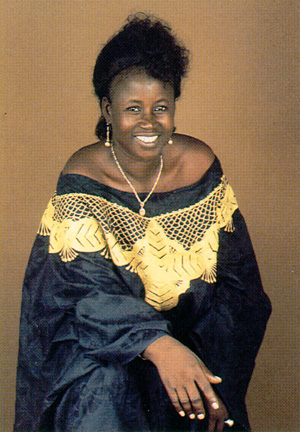Frank Bessem's Musiques d'Afrique
Back to Musiques d'AfriqueBack to Music of Mali
:: Cette page en français ::
Sali Sidibé (1960-2019)
(Mali)
Biography
Sali Sidibé is another exponent of wassoulou style of music, predominantly
performed by female singers from the South of Mali. In the footsteps of the pioneers Kagbe Sidibé and
Coumba Sidibé, Sali became one of the most popular Wassoulou singers in Mali.
Her music is somewhat different from that of Oumou Sangaré,
but more similar to the style of Nahawa Doumbia since she is using the same
didadi rhythm.
Unlike the malinké praise singers, these young artists addressed contemporary issues in their lyrics, such as social problems. Although the singers are mainly Peul they are singing in the wassoulou dialect of the bambara language.
The pentatonic wassoulou music itself is very distinct from malinké music and is reminiscent of the rhythms of Malian hunter music played with the Dozon N'Goni (hunter's lute), but using instead the smaller Kamelen N'Goni (6-string youth lute). Other instruments used are the traditional one-string violon, the soukou, the M'Bolon (bass lute), the Senoufo balafon, the Djembé and and also the electric guitar. The rhythms are repetitive and hypnotising, but there is room for improvisation on the string instruments.
Although her family was opposed to a musical career (her father being a marabout), Sali started singing in the Ensemble Instrumental National du Mali in the early 1980s, during which she recorded two albums. In 1987, she formed her own ensemble, and their cassette « Tounkan Magni » was a big hit in Mali, before anyone had heard of Oumou Sangaré.
Few recordings of her were internationally distributed, but on the two Wassoulou Sound samplers released by Stern's Music, there were a few Sali Sidibé tracks, such as « Wale Gnouma Don », « Djen Magni » and « Ntanan » on vol. 1 (1991), and « Gnouman Ke La » on vol. 2 (1994).
The album « Wassoulou Foli » was the album that made her famous.
Unlike the malinké praise singers, these young artists addressed contemporary issues in their lyrics, such as social problems. Although the singers are mainly Peul they are singing in the wassoulou dialect of the bambara language.
The pentatonic wassoulou music itself is very distinct from malinké music and is reminiscent of the rhythms of Malian hunter music played with the Dozon N'Goni (hunter's lute), but using instead the smaller Kamelen N'Goni (6-string youth lute). Other instruments used are the traditional one-string violon, the soukou, the M'Bolon (bass lute), the Senoufo balafon, the Djembé and and also the electric guitar. The rhythms are repetitive and hypnotising, but there is room for improvisation on the string instruments.
Although her family was opposed to a musical career (her father being a marabout), Sali started singing in the Ensemble Instrumental National du Mali in the early 1980s, during which she recorded two albums. In 1987, she formed her own ensemble, and their cassette « Tounkan Magni » was a big hit in Mali, before anyone had heard of Oumou Sangaré.
Few recordings of her were internationally distributed, but on the two Wassoulou Sound samplers released by Stern's Music, there were a few Sali Sidibé tracks, such as « Wale Gnouma Don », « Djen Magni » and « Ntanan » on vol. 1 (1991), and « Gnouman Ke La » on vol. 2 (1994).
The album « Wassoulou Foli » was the album that made her famous.

Sali Sidibé
• Musicians on "Wassoulou Foli":
Salimata Sidibé vocals;
Aminata Diabaté, Fatim Sissoko backing vocals;
Harouna Samaké ngoni;
Mamadou Coulibaly m'bolon;
Zoumana Tereka (sp : Tereta?) violon;
Adez Traoré flute;
Samba Diakité balafon;
Boubacar Kane djembé.
Rakesh Touré: keyboards (tracks 1,2,3,6,7,9);
Phamphile de Souza: drum programming (tracks 1,2,3,6,7,9);
Harouna Barry: arrangements;
Adez Traoré: arrangements (tracks 3,5,8)
Born: 10 March 1960, in a village 60km south of Bamako, as Salimata Sidibé
Died: 8 February 2019 in Bamako
Style: wassoulou music
Discography
Salimata Sidibé vocals;
Aminata Diabaté, Fatim Sissoko backing vocals;
Harouna Samaké ngoni;
Mamadou Coulibaly m'bolon;
Zoumana Tereka (sp : Tereta?) violon;
Adez Traoré flute;
Samba Diakité balafon;
Boubacar Kane djembé.
Rakesh Touré: keyboards (tracks 1,2,3,6,7,9);
Phamphile de Souza: drum programming (tracks 1,2,3,6,7,9);
Harouna Barry: arrangements;
Adez Traoré: arrangements (tracks 3,5,8)
Born: 10 March 1960, in a village 60km south of Bamako, as Salimata Sidibé
Died: 8 February 2019 in Bamako
Style: wassoulou music
Discography
| Title | Year | Label | Remarks |
| Union africaine | 2000 | Camara Productions | |
| Wassoulou Foli | 1993 | Stern's STCD 1047 | CD |
| From Timbuktu to Gao | 1993 | Shanachie 65011 | Reissue of N'Daya International |
| N'Daya International | 199? | Camara Productions CD CK7 003 | CD |
| Tounkan Magni | 1987 | Syllart 8362 | Cassette |
| Formidable ! - Sali Sidibe 82 | 1982 | Polydisc BH 0001 | LP |
| L'enfant chéri du Wassolon vol.1 | 1980 | Disco Club de la Bagoué F.T. 002 | LP |
Page added December 2001
